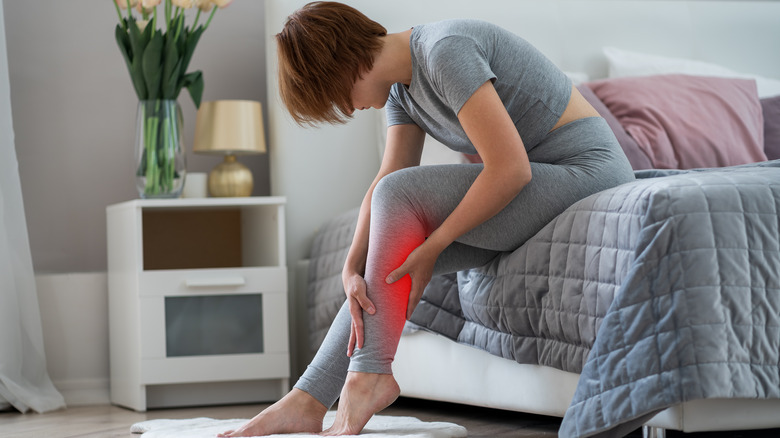Charley horses, those sudden and painful muscle cramps that often strike without warning, can be both alarming and incredibly uncomfortable. These involuntary muscle contractions most commonly occur in the legs, particularly the calves, and can affect anyone regardless of age or fitness level. While they are generally harmless, frequent or severe charley horses can significantly disrupt daily activities and quality of life. In this article, we will delve into what charley horses are, why they happen, and what you can do to prevent and treat them effectively.
Understanding Charley Horses
The term ‘charley horse’ is often used to describe muscle cramps or spasms, particularly in the calves. Scientifically, these cramps are sudden, involuntary contractions of one or more muscles. They are usually brief but can sometimes last several minutes, causing intense pain and temporary immobility. While charley horses can occur during physical activity, they are also common during rest, particularly at night, leading to disrupted sleep and discomfort.
Common Causes of Charley Horses

There are numerous factors that can contribute to the occurrence of charley horses. These can include dehydration, which leads to an imbalance of electrolytes such as potassium, magnesium, and calcium that are critical for muscle function. Overexertion or prolonged physical activity, particularly involving repetitive motions, can also trigger cramps. Additionally, poor circulation, nerve compression, a lack of stretching before exercise, and even certain medications can increase the likelihood of experiencing charley horses. Pregnant women and older adults are also more susceptible due to changes in body conditions and muscle elasticity.
Symptoms of Charley Horses
The primary symptom of a charley horse is sudden, sharp pain in the affected muscle, often accompanied by a hard lump of muscle tissue under the skin. The cramping muscle may feel firm to the touch, and the pain can range from mild to severe. In some cases, the area may also be tender or sore for a while after the cramp subsides, and there might be a temporary limitation in movement or flexibility.
Prevention Strategies

Preventing charley horses involves addressing the various risk factors associated with muscle cramps. Staying well-hydrated is crucial, as is maintaining a balanced diet rich in electrolytes. Stretching before and after physical activities, gradually increasing exercise intensity, and not overloading your muscles can also help. Wearing properly-fitted shoes and avoiding prolonged periods of inactivity or sitting can support better circulation and muscle health. Additionally, incorporating activities that promote overall muscle flexibility, such as yoga or Pilates, can be beneficial.
Effective Treatments for Charley Horses
When a charley horse strikes, immediate treatment can help alleviate the discomfort. Gently stretching and massaging the cramped muscle can provide relief. Applying heat in the form of a warm towel or heating pad can help relax the muscle, while a cold pack can reduce pain and inflammation. Staying hydrated by drinking water or electrolyte-rich fluids is also essential. For severe or persistent cramps, over-the-counter pain relievers may be considered, but it’s always best to consult a healthcare provider for personalized advice.
Dietary Considerations
Diet plays a significant role in preventing charley horses. Consuming foods rich in potassium (such as bananas, oranges, and potatoes), magnesium (found in nuts, seeds, and green leafy vegetables), and calcium (including dairy products, fortified plant milks, and leafy greens) can help maintain proper electrolyte balance. Drinking plenty of water and avoiding excessive caffeine or alcohol can also aid in keeping muscles properly hydrated and functioning well.
When to Seek Medical Attention
While charley horses are typically benign, there are situations in which medical attention may be necessary. If muscle cramps are frequent, severe, or persistent and interfere with daily life, it is important to consult a healthcare provider. Additionally, if cramps are accompanied by swelling, redness, or other unusual symptoms, or if they occur alongside other health issues, seeking medical advice is crucial to rule out underlying conditions like nerve compression, circulatory problems, or deficiencies that may require specific treatment.
Conclusion
Charley horses, though often a minor nuisance, can be distressing and disruptive. Understanding their causes and taking steps to prevent them can significantly reduce their frequency and severity. By staying hydrated, maintaining a balanced diet, and practicing good exercise habits, you can keep your muscles healthy and minimize the occurrence of these painful cramps. Should they occur, simple treatments like stretching, massage, and proper hydration can offer quick relief. And remember, when in doubt, always seek professional medical advice to address any persistent or concerning issues.



